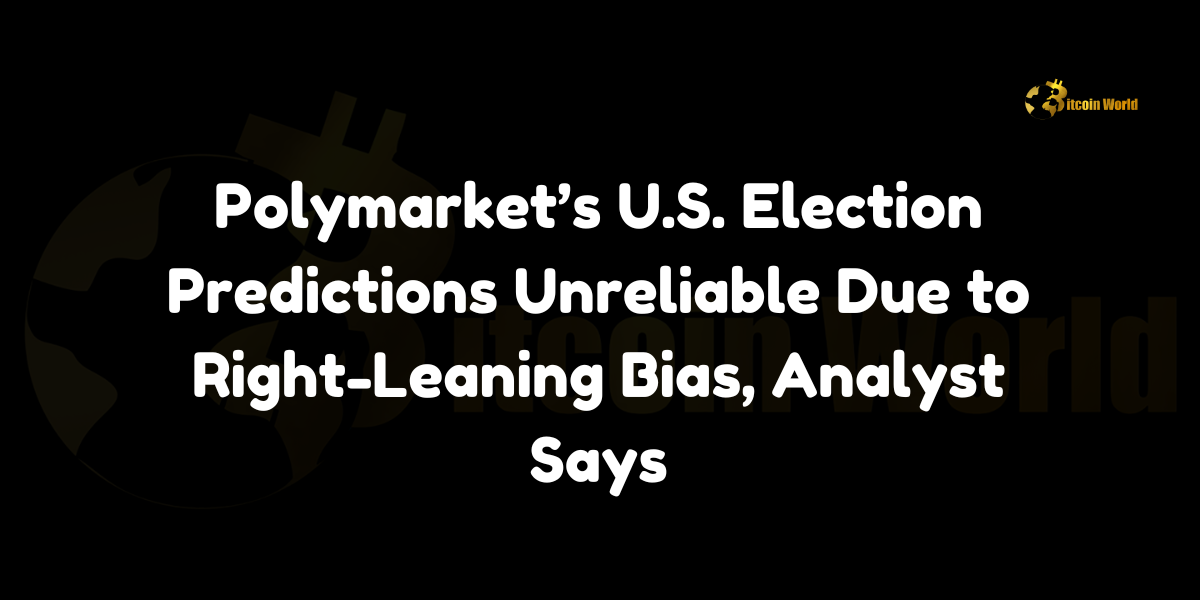Polymarket’s U.S. Election Predictions Unreliable Due to Right-Leaning Bias, Analyst Says
In a critical assessment of Polymarket’s U.S. election predictions, WhaleWire analyst Jacob King has raised concerns about the platform’s reliability, attributing its skewed forecasts to a right-leaning bias among its user base. King shared his insights on X (formerly Twitter), highlighting that Polymarket’s favorable predictions for former President Donald Trump may not accurately reflect the broader American electorate’s sentiments.
Analyst’s Critique of Polymarket‘s Predictions
Jacob King, a seasoned analyst at WhaleWire, contended that Polymarket’s election forecasts are unreliable due to the platform’s inherent biases. He pointed out that the majority of crypto bettors on Polymarket tend to lean right, which significantly influences the platform’s prediction outcomes. “Polymarket’s predictions favoring Trump are unreliable as most crypto bettors lean right,” King stated, underscoring the disproportionate representation of political leanings among its users.
Factors Contributing to Bias
King further elaborated that Polymarket is primarily restricted to U.S. citizens, with only foreign users or those utilizing VPNs participating in the platform. This limitation means that the user base, although ostensibly American, includes a significant number of non-native participants who may not accurately represent the broader U.S. population’s political inclinations. “The platform is restricted for U.S. citizens, with only foreign or VPN users participating, meaning it barely reflects American opinions,” King explained.
Implications for Election Forecasting
The skewed demographics of Polymarket’s participants raise questions about the accuracy and fairness of its election predictions. With a right-leaning majority among bettors, the platform’s forecasts are likely to overstate Trump’s chances, thereby providing a distorted view of the actual electoral landscape. This bias undermines the utility of Polymarket as a reliable tool for gauging election outcomes, as it fails to capture a balanced spectrum of voter sentiment.
King’s Expectations for the 2024 Election
Despite the apparent lead Donald Trump may have on Polymarket, Jacob King remains confident that Kamala Harris will secure the presidency. He attributes his prediction to what he describes as right-wing overconfidence among Trump’s supporters. “Despite Trump’s lead, I expect Harris to become the next president, attributing this to right-wing overconfidence,” King asserted. His outlook suggests that the underlying voter dynamics, beyond the platform’s biased predictions, will favor Harris in the upcoming election.
Broader Impact on Prediction Markets
King’s analysis highlights a broader issue within prediction markets—the influence of user demographics on forecasting accuracy. When a platform’s user base is not representative of the general population, its predictions can be misleading, thereby reducing the credibility of such markets as tools for election forecasting. This scenario calls for greater transparency and efforts to ensure diverse and balanced participation in prediction platforms to enhance their reliability and predictive power.
Conclusion
Jacob King’s critique of Polymarket underscores the challenges faced by prediction markets in maintaining objectivity and accuracy. The identified right-leaning bias and restricted user participation compromise the platform’s ability to provide a true reflection of the American electorate’s will. As the 2024 U.S. election approaches, stakeholders and investors should approach Polymarket’s forecasts with caution, recognizing the potential for bias and the importance of considering a multifaceted approach to election analysis.
Disclaimer: This analysis is based on the opinions of Jacob King and does not constitute financial or investment advice. Investors should conduct their own research and consult with a financial advisor before making any investment decisions.
To learn more about the innovative startups shaping the future of the crypto industry, explore our article on latest news, where we delve into the most promising ventures and their potential to disrupt traditional industries.





